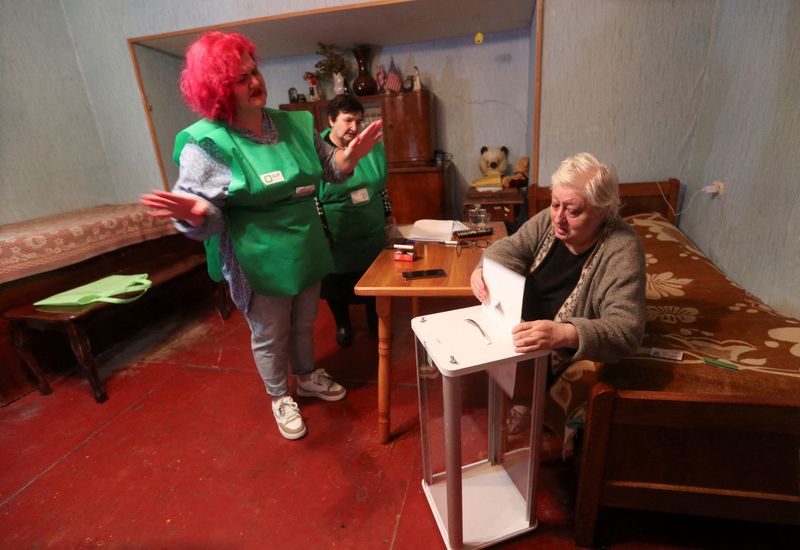By Felix Light and Lucy Papachristou
TBILISI (Reuters) -Georgia voted on Saturday in parliamentary elections described by both sides as an existential battle that will determine whether the country aligns closely with the West or leans back toward Russia.
The election pitted the Georgian Dream party, which has been in power since 2012, against the four main blocs representing the pro-Western opposition. Polls opened at 0400 GMT and will close at 1600 GMT, with around 3.5 million Georgians eligible to vote.
The billionaire founder of Georgian Dream and former prime minister, Bidzina Ivanishvili, said the election was “a very easy choice.
“Should we elect a government that serves you, the people of Georgia … or elect an agent from a foreign country who will only complete the tasks of a foreign country,” said Ivanishvili, who is considered the country’s main powerbroker. vote in Tbilisi on Friday.
“Today will determine the future of Georgia,” President Salome Zourabichvili, a critic of the Georgian Dream whose power is mostly ceremonial, said after voting in the capital.
“Tonight there will be victory and that victory will be Georgia, all Georgia,” he said.
Georgia, which lost territory to Russian-backed separatists in the 1990s and was defeated during a brief Russian invasion in 2008, has for decades been one of the most pro-Western countries to emerge from the Soviet Union.
But since Russia’s invasion of Ukraine in 2022, Georgian Dream has moved the country firmly back into Moscow’s orbit, accusing the West of trying to provoke war. The opposition called the changes a betrayal of Georgia’s European future.
Media sympathetic to the opposition have published rival opinion polls, with pro-opposition broadcasters predicting Georgian Dream will lose its majority, and those supporting the ruling party predicting a landslide victory with the best show.
Although all parties say they hope for a peaceful vote, the Caucasus country has had a volatile political history since the 1991 breakup of the Soviet Union, with several popular uprisings and episodes of civil unrest.
Authorities used force to disperse demonstrations this year against a law requiring groups that receive funding from abroad to register as foreign agents, which the opposition and the West say is a Russian-inspired move to stifle dissent.
‘GLOBAL WAR PARTY’
Ivanishvili has framed Saturday’s election as an existential battle to prevent what he calls the “Global War Party” in the West from pushing Tbilisi into direct conflict with Moscow.
“At the moment, some people don’t understand the danger we can face if we are defeated. But we will try our best to win and show people the right path,” Georgian Dream activist Sandro Dvalishvili told Reuters.
Georgian Dream said its goal was to gain three-quarters of the seats in parliament to introduce constitutional bans on the main opposition party, the United National Movement.
Opposition parties and President Zourabichvili accused Georgian Dream of buying votes and intimidating voters, which they denied.
Local media reported several incidents of physical violence outside polling stations, as well as instances of ballot stuffing in the southern town of Marneuli, which invalidated the precinct’s results.
Opposition activists say that only a close alliance with the West, including EU membership, will protect Georgia from Russia.
“The hunger of Russian imperialism knows no bounds. And that’s why we need strong allies. And that strong ally is in the European Union,” said Nana Malashkhia, a former civil servant who became famous last year after being filmed waving an EU flag while being blasted with water cannons. police in protest. He is currently in parliament.

The European Union granted Georgia candidate membership status last year but has put the application on hold in response to what it calls a backsliding in democracy in the Georgian Dream.
The four main opposition parties aim to form a coalition government to oust Georgian Dream from power and put Georgia back on track to join the EU.




